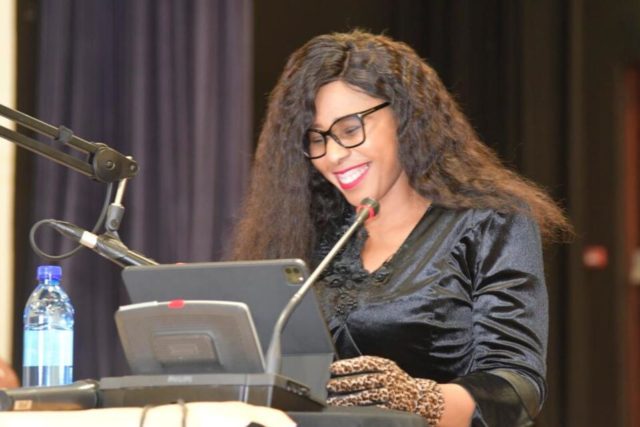MEC Mase Manopole said a nursery would be established to return and cultivate indigenous plants that were stolen from the Northern Cape.
THE NORTHERN Cape MEC for Agriculture, Environmental Affairs, Land Reform and Rural Development, Mase Manopole, said a nursery would be established to return and cultivate indigenous plants that were stolen from the Province.
During her budget speech, which she delivered in Kathu on Tuesday, Manopole stated that the Namakwa District had become extremely vulnerable to the poaching of endemic plants and reptiles.
“An amount of R700,000 has been allocated for the protection of the Province’s fauna and flora in the Namakwa District for the 2022/23 financial year,” said Manopole.
She added that confiscated plants were currently kept at locations outside the borders of the Province.
“It is important to have it returned to its rightful habitat due to its endemic status and cultural value.
“The department will partner with stakeholders to collect and conserve seeds of these endemic plants that are being poached to ensure we combat the risk of extinction of our plants. The seeds will be collected, treated and stored.”
She added that a working group comprising of a research and development, biodiversity management and an environmental quality management unit would be established.
“The establishment of a working group will ensure engagements with Conservation South Africa, appointment of monitors and continued engagement and working together with the SAPS stock theft and endangered species unit.
“Community engagement forms an integral part of the anti-poaching effort and Conservation South Africa (CSA). A non-governmental organisation operating in the Namakwa District will be engaged as a strategic partner due to its proximity to identified hot spots.”
She added that the department would continue with its engagement with the SAPS in the management of cases reported and with its participation in Operation Phakisa to ensure a co-ordinated response to illegal activities reported.
Manopole believed that job creation was the solution to address the challenges of unemployment and food insecurity in the agricultural sector in the Province.
She pointed out that the natural resources in the Province could provide many opportunities in the immediate and near future.
Manopole added that R3.9 million had been set aside for the creation of 181 jobs between April 2022 and March 2023 at the coast, parks, cleaning and greening of community parks, Covid-19 screeners and at the Barkly West community nursery.
“A total 550 Expanded Public Works Programme (EPWP) work opportunities will be created under Comprehensive Agricultural Support Programme and the Illima/Letsema programme were created during the 2022/23 financial year.”
She stated that a state veterinarian would be appointed through a public-private partnership at the De Aar abattoir.
“The private sector came on board and assisted government by providing the services of a vet to assist the abattoir. The appointment of a permanent state veterinarian will be finalised in this financial year.
“The appointment will ensure that the abattoir remains registered for the lucrative export market to the European Union and current employment of personnel is guaranteed. The abattoir employs 33 workers from De Aar and adjacent areas thus improving the employment rate within the Pixley ka Seme District.”
Manopole added that harvesting of raisins had been very difficult during the 2020/21 and 2021/22 harvesting seasons, where the Northern Cape produced 88 percent of the country’s raisin supply.
“Both the Orange and Vaal rivers were flooded due to above average rainfall upstream of the catchment areas. The region also experienced above average rainfall that has severely impacted production.
“Increasing inputs such as double-digit increases in electricity, fertiliser, pesticides and labour costs will impact the financial position of our raisin growers and the local economy.”
Manopole stated that waste management programmes would be rolled out across the Province in an effort to improve waste collection and disposal.
“This will be done by rolling out pilot household recycling initiatives, implementing community-based waste collection services where waste services are not currently rendered. Dustbins will be provided at parks.”
She added that the department had repaid the loan owed by the non-profitable Warrenton Super Chicken to the Land Bank.
“The farm was put on auction to recover their money owed while the enterprise continued to be plunged into more debt.
“This year we appointed a business change specialist to assist with a turn-around strategy, legal and governance issues to revive the poultry business and improve the economy of the area.”
She indicated that to date 59 shareholders were permanently employed on the farm since February 2022.
“They receive a stipend of R3,500 per month.”
The total budget allocated for the 2022/23 financial year: R686.1 million
Agricultural producer support and development: R239.2 million
Sustainable development: R27.4 million
Rural development: R20.7 million
Expanded Public Works Programme Incentive Grant: R3.8 million
Environment and nature conservation: R77.8 million
Agriculture Economics Services programme: R12.3 million
Research and technology development services: R61.3 million
Administration: R198.1 million
Veterinary services: R49.1 million
Food security projects
Dripper lines and irrigation system, pipes and fittings, production inputs and equipping of solar pump installation in the Pixley ka Seme District: R400,000
Installation of layer houses, cages, plain egg holder, security fence, tank stand, irrigation equipment, inputs, solar water pump, shade net and poles, drilling, testing and equipping of borehole in the Frances Baard District: R797,100
Purchase of office space and storage container Wendy houses, production inputs, fencing, purchasing and construction of shade nets, production inputs, purchasing of hand plough machine, layer hens, a structure for 260 layer hens and feeds: R650,000
Installation of a mini aquaphonics system in the Namakwa District: R1.9million








